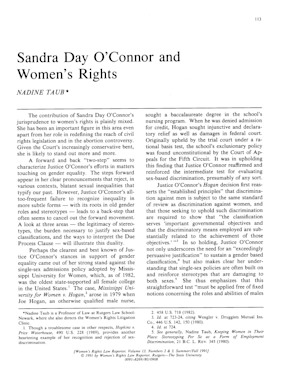Sandra Day O'Connor and Women's Rights
June 1991

DISCLAIMER: This text has been transcribed automatically and may contain substantial inaccuracies due to the limitations of automatic transcription technology. This transcript is intended only to make the content of this document more easily discoverable and searchable. If you would like to quote the exact text of this document in any piece of work or research, please view the original using the link above and gather your quote directly from the source. The Sandra Day O'Connor Institute does not warrant, represent, or guarantee in any way that the text below is accurate.
Article Text
(Excerpt, Automatically generated)
Sandra Day O'Connor and Women's Rights
NADINE TAUB*
The contribution of Sandra Day O'Connor's jurisprudence to women's rights is plainly mixed. She has been an important figure in this area even apart from her role in redefining the reach of civil rights legislation and in the abortion controversy. Given the Court's increasingly conservative bent, she is likely to stand out more and more.
A forward and back "two-step" seems to characterize Justice O'Connor's efforts in matters touching on gender equality. The steps forward appear in her clear pronouncements that reject, in various contexts, blatant sexual inequalities that typify our past. However, Justice O'Connor's all too-frequent failure to recognize inequality in more subtle forms - with its roots in old gender roles and stereotypes - leads to a back-step that often seems to cancel out the forward movement. A look at three areas - the legitimacy of stereo types, the burden necessary to justify sex-based classifications, and the ways to interpret the Due Process Clause - will illustrate this duality.
Perhaps the clearest and best known of Jus tice O'Connor's stances in support of gender equality came out of her strong stand against the single-sex admissions policy adopted by Missis sippi University for Women, which, as of 1982, was the oldest state-supported all female college in the United States.1 The case, Mississippi Uni versity for Women v. Hogan,2 arose in 1979 when Joe Hogan, an otherwise qualified male nurse,
sou
